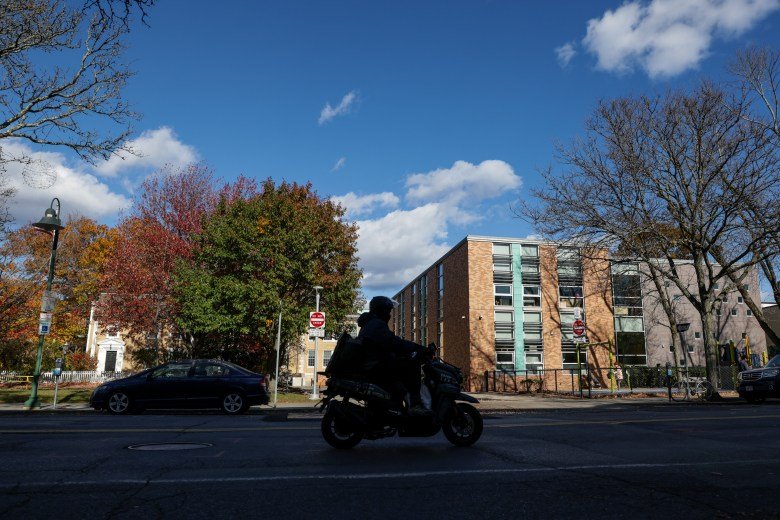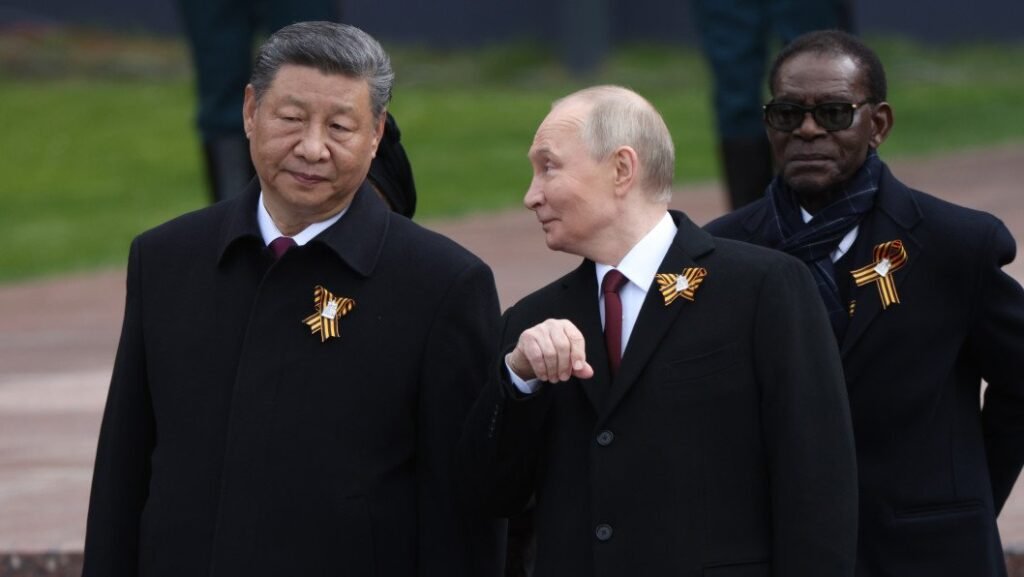Fans of the late, great Dr Michael Mosley will be graced with one last fantastical documentary fronted by the health guru.
Filmed last year, the three-part Channel 5 programme sees the former Mail columnist decode the marvels of the human body – and discover everything from why bones break as we age, to pioneering cancer treatments.
Dr Mosley, who died from heat exhaustion aged 67 while on holiday in Greece, puts his own body under the microscope, undergoing experiments to test his heart health, saliva production and how his body copes with a dip in freezing waters.
In the first installment, to be broadcast at 8pm on Thursday, Dr Mosley heads to Fife to meet Thomas, who suffers a common neurological condition, and is about to undergo pioneering brain surgery.
The 71-year-old suffers essential tremor, which affects roughly a million Brits and causes involuntary shaking or trembling.
Michael Mosley, who died this summer while on holiday in Greece , puts his own body to the test in the three-part series, testing his heart health, his saliva production and even taking a freezing dip himself

To test out a new heart disease predictor, the former Mail columnist steps forward for the procedure – which sees him have dye injected into his bloodstream so that his blood vessels show up on the CT scan.
Essential tremor is nearly ten times more common than Parkinson’s and tends to affect people over the age of 65.
But for Thomas, symptoms began in his forties, when he first noticed his right hand shaking.
By his mid-fifties, both hands, as well as his head, were shaking – and it just continued to worsen.
But now, Thomas is off to Dundee to receive a potentially life-changing surgery.
The innovative procedure uses a beam of ultrasound waves to zap a tiny cluster of cells in a part of his brain called the thalamus, which is involved with movement.
Doctors hope this will create a circuit breaker that will stop Thomas’s brain from sending out too many confusing messages that cause his uncontrollable tremor.
Fitted with a head brace to help keep him still, Thomas is kept awake throughout the surgery to ensure the beam doesn’t impact the parts of his brain that control his speech.
If it strays even a fraction, he could be left unable to speak – or paralysed.
To test his brain function after each round of the ultrasound, Thomas’ doctors have him draw a spiral on a piece of paper.

The three-part series sets out to decode the marvel of design and engineering that is the human body, inviting viewers to see our bodies in new ways and understand how they work and how the body changes as we age

In the first episode, Dr Mosley heads to Dundee to meet tremors sufferer Thomas who is about to undergo pioneering brain surgery
At first, he’s barely able to make a mark on the page.
But after seven rounds, his hand has stopped shaking enough that he is able to make a full spiral.
‘I’m so grateful,’ Thomas says – ‘I noticed a change right away. I’ve improved way more than I thought I would.’
‘It’ll make a life-changing difference.’
Later in the episode, Dr Mosley meets 76-year-old Allen, who is about to learn if his experimental cancer treatment has been a success.
Allen was diagnosed with stage 4 lymphoma – a type of blood cancer – a few years prior.
‘They said that there wasn’t really much they could do to cure me,’ he explained.
Prior to his diagnosis, Allen was a policeman in London, and spent nine years as Princess Diana’s personal protection officer.
He started noticing symptoms of his cancer once he’d retired to Dorset, around the same time a family of Ukrainian refugees came to live with him.
After his diagnosis, they decided to stay and help care for their host.
‘I’d already planned and paid for my funeral,’ Allen said.
‘I didn’t think I’d be around much longer.’
But then, Allen was thrown a lifeline by his medical team in Southampton; a treatment known as CAR T-cell therapy.

Throughout the episodes, the doctor continues to track down answers to burning questions such as why do we get creaky joints? What happens when we catch the flu? Can we help our brains stay fit as we age? How do doctors replace a hip?
The revolutionary new cancer treatment works by boosting the body’s immune system, helping it to spot and fight cancer.
T-cells – the body’s fighter cells – are removed, modified in the lab and re-injected into the bloodstream.
These genetically edited cells now have a turbo-charged ability to track down and eradicate cancer cells.
The approach doesn’t work for everyone, but Allen luckily receives brilliant news at his check-up; he’s in complete remission.
Previously littered with cancerous tumours, his scans are now showing up clean.
Thanks to breakthrough treatments like this, Dr Mosley explains, we’re now six times more likely to survive cancer than we were 40 years ago – although one in two of us will be diagnosed with it in our lifetimes.
Similarly astonishing technologies have emerged in recent years that tackle another major health concern for Brits – heart disease.
Almost a quarter of all deaths in the UK are due to cardiovascular problems.
But a new test developed by researchers at the University of Oxford claims to be able to detect heart problems long before you have any symptoms.
By looking at the fat that surrounds the heart vessels, scientists are able to spot early signs of infammation in the arteries, which could indicate a heart attack later down the line.
To test it out, Dr Mosley steps forward for the procedure – which sees him have dye injected into his bloodstream so that his arteries show up on the CT scan.
The episode also sees the doctor bravely sign up to a slightly more bracing experiment – a cold water swim.
Speaking to cold water devotees – as well as trying it out himself – Dr Mosley reveals that when you swim in cold water, your arteries narrow – making your heart work harder to pump blood, strengthening its muscles.
The plunge also releases hormones that are said to increase the body’s metabolic rate and boost your mood.
Some regular swimmers even claim it helps with immune function as well – stopping them, ironically, from catching common colds.
Finally, Dr Mosley examines why our bones become more brittle as we age.
To investigate bone health, he travels back to the University of Oxford – this time to meet with Professor Sue Black.
She explains that bones – while they may look solid from the outside – are actually very much alive and moving on the inside.
As we age, the hormones such as estrogen that feed these bone cells begin to lessen.
After menopause, however, estrogen levels drop – causing the bones to become rapidly weaker.
Microfractures begin to form, which often fail to heal themselves.
The condition – known as osteoporosis – is incredibly common: affecting one in five women and one in 20 men.
To protect our bones as we age, we need to consume plenty of calcium and vitamin C – as well as continuing to do weight-bearing exercises like running and dancing.
The episode concludes with Dr Mosley agreeing to have a camera inserted through his nose to look at his voicebox – and revealing the shocking fact that humans produce enough saliva each month to fill an entire bathtub.
In the next installment of the docuseries, he’ll look at hip replacements, stress and three things you can do at home to reduce blood pressure without joining a gym.






